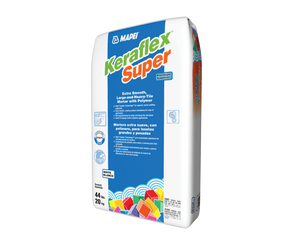
Mapei Keraflex Super Mortar
KERAFLEX SUPER MORTAR
KERAFLEX SUPER MORTAR
Premium, Extra Smooth, Large-and-Heavy-Tile Mortar with Polymer
Keraflex Super is a highly versatile, non-sag/nonslump, large-and-heavy-tile mortar and thin-set mortar for tile and stone for installations on floors, walls and countertops. This polymer-modified mortar has a high content of a unique dry polymer, resulting in excellent adhesion to the substrate and tile, with enhanced resistance to freeze/thaw environments.
It is formulated with Easy Glide Technology™ for ease of application and with a consistency that allows adjustability when used with lippage control systems. Keraflex Super can also be used as a mortar over uncoupling, crack-isolation, sound-reduction and waterproofing membranes.
INFORMATION
WETTING
High-Transfer Technology™ for superior mortar-wetting properties
QUALITY
Extra smooth, creamy consistency for ease of application
BRAND
Mapei
PRODUCT TYPE
Mortar
PROPERTIES
Easy mixing, handling and troweling properties
CONDITION
Highly resistant to extreme freeze/thaw conditions
APPILACTION
-Non-sag formula for large-format and heavy tile/stone in wall applications -Nonslump formula for large-format and heavy tile/stone in floor applications -Ideal for lippage control systems applications -Approved for interior/exterior water immersion application
DEATIL
- For water features, fountains and pools
- Polymer-enriched for high performance
- For use over plywood and a variety of membranes
- For bond coats up to 1/2" (12 mm) in embedded thickness
DOWNLOADS
Technical Data Sheet
Safety Data Sheet
EPD
Sustainability Product Report
Volatile Organic Compound
WHERE TO USEC
-Interior/exterior residential and commercial installations on floors, walls and countertops in dry and wet areas -Installation of most types and sizes of gauged porcelain tiles; most large and heavy tile and stone; all types of ceramic and porcelain tile, glass tile and Saltillo tile; and most marble, granite and natural stone
MIXING
Before product use, take appropriate safety precautions. Refer to the Safety Data Sheet for details.
1. Pour clean, potable water into a clean mixing container.
2a. For non-sag/nonslump applications: Use about 7.6 to 8.4 U.S. qts. (7.19 to 7.95 L) of water.
2b. For MAPEI membranes: Use about 8.4 to 9.3 U.S. qts. (7.95 to 8.80 L) of water.
3. Gradually add 44 lbs. (20 kg) of powder while slowly mixing.
4. Use a low-speed mixing drill (at about 300 rpm), with an angled cross-blade mixer or spiral mixer. Mix thoroughly until the mixture becomes a smooth, homogenous, lumpfree paste. Avoid prolonged mixing.
5. Let mixture stand (“slake”) for 5 minutes.
6. Remix.
7. If the mixture becomes heavy or stiff, remix it without adding more liquid.
PRODUCT APPLICATION
PRODUCT APPLICATION
If installing glass tile, consult specifications by the manufacturer to verify the suitability of Keraflex Super for specific installations and installation procedures
APPLY
Apply additional mortar, combing it in a single direction with the trowel’s notched side. For glass tile and mosaics, knock down the trowel ridges to ensure that they do not show through tiles.
PRESSURE
With pressure, apply a coat by using the trowel’s flat side to key mortar into the substrate.
INSTALLATION
For glass tile, follow immediately with a proper beating-in of the tiles to flatten ridges or notches. For the installation
CONDITITON
Spread only as much mortar as can be tiled before the product skins over. Open time can vary with jobsite conditions
TROWEL
Choose a notched trowel (see the “Approximate Coverage” chart) with sufficient depth to achieve more than 80% mortar contact to both the tile and substrate for all interior applications, and more than 95% for exterior, commercial floor and wet applications. It may be necessary to back-butter the tile in order to meet these requirements. Glass-tile installations require 100% continuous coverage. (Refer to ANSI A108.5 specifications and TCNA or TTMAC guidelines.)
DIRECTION OF USE
Place tiles firmly into the wet mortar. Push the tiles back and forth in a direction perpendicular to trowel lines, to collapse the mortar ridges and to help achieve maximum coverage. Ensure proper contact between the mortar, tile and substrate by periodically lifting a few tiles to check for acceptable coverage.
VIDEOS




